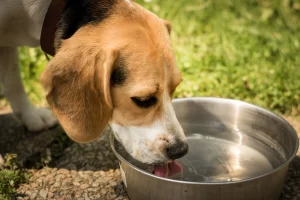If you’re a dog owner, you know how concerning it can be when your furry friend is not feeling well. One common issue that dogs may experience is dry heaving, which can be caused by a range of factors, including respiratory problems, gastrointestinal issues, stress, and more. While it’s essential to consult with a veterinarian to determine the underlying cause and receive appropriate treatment, there are also several home remedies for dog dry heaving that you can try to alleviate your dog’s discomfort. In this article, we will explore various natural remedies, dietary changes, and lifestyle modifications that can help soothe your dog’s dry heaving and improve its overall health and well-being.
Table of Contents
ToggleWhat is dry heaving in dogs?
Dry heaving, also known as retching, is a reflex action that involves the contraction of the muscles in the dog’s abdomen and chest to expel air from the stomach and throat without producing any vomit or other materials. This action may be accompanied by gagging, coughing, or other signs of discomfort.
In dogs, dry heaving can occur due to a variety of reasons, such as eating too fast, eating something that is not digestible, infections, gastrointestinal issues, respiratory infections, or other medical conditions. It is important to note that while dry heaving may be a common occurrence in some dogs, it can also be a sign of a more serious underlying health issue that requires veterinary attention.
Symptoms of dry heaving in dogs may include retching or gagging sounds, coughing, excessive drooling, lack of appetite, lethargy, and difficulty breathing. If these symptoms persist, it is recommended to seek veterinary care to determine the underlying cause of the dry heaving and provide appropriate treatment.
Causes of dry heaving in dogs
There are many potential causes of dry heaving in dogs, ranging from minor issues to serious medical conditions. Here are some of the most common causes:
- Eating too quickly: Dogs that eat their food too quickly may swallow air along with their food, leading to dry heaving and other digestive issues.
- Gastrointestinal problems: Gastrointestinal issues such as gastroenteritis, constipation, pancreatitis, or inflammatory bowel disease can cause dry heaving in dogs.
- Foreign body obstruction: Dogs may swallow objects that can get lodged in their gastrointestinal tract, leading to dry heaving.
- Respiratory infections: Respiratory infections such as kennel cough, pneumonia, or other upper respiratory infections can cause dry heaving.
- Allergies: Dogs may develop allergies to food, pollen, or other environmental allergens, which can cause dry heaving.
- Acid reflux: Acid reflux can occur when the valve between the esophagus and stomach doesn’t work properly, allowing stomach acid to back up into the esophagus and causing irritation and dry heaving. In these situations, some home remedies may be beneficial.
- Dental problems: Dental issues such as periodontal disease or oral tumors can cause dry heaving in dogs.
- Medications: Some medications can cause gastrointestinal irritation and dry heaving in dogs.
- Heatstroke: Dogs that become overheated can experience dry heaving and other signs of distress.
- Stress: Dogs may experience stress from changes in their environment, separation anxiety, or other factors, which can lead to dry heaving.
Symptoms and signs of dry heaving in dogs
Symptoms and signs of dry heaving in dogs can vary depending on the underlying cause. Here are some of the most common symptoms and signs:
- Retching or gagging: Dogs may make retching or gagging sounds and appear to be trying to vomit or cough up something.
- Coughing: Dry heaving can cause dogs to cough or hack in an attempt to clear their throat.
- Lack of appetite: Dogs experiencing dry heaving may lose their appetite and refuse to eat or drink.
- Lethargy: Dogs may appear lethargic, tired, and less interested in playing or exercising.
- Excessive drooling: Dry heaving can cause dogs to drool excessively or foam at the mouth. Try these home remedies to stop excessive drooling.
- Abdominal discomfort: Dogs may show signs of abdominal discomfort such as hunching or arching their back, or showing signs of pain when their abdomen is touched.
- Difficulty breathing: Dry heaving can make it difficult for dogs to breathe, and they may pant or breathe heavily.
- Restlessness: Dogs may appear restless, pacing, and unable to settle down due to discomfort.
Determine the underlying cause of the dry heaving to provide appropriate treatment. If the dry heaving is accompanied by other symptoms such as vomiting, diarrhea, fever, or lethargy, it is recommended to seek veterinary care. A veterinarian can perform a physical examination, run diagnostic tests, and determine the cause of the dry heaving based on the symptoms and the dog’s medical history. Depending on the cause, treatment may include medications, dietary changes, or lifestyle adjustments.
Home remedies for dry heaving in dogs
While it is always recommended to seek veterinary care for dry heaving in dogs, there are some home remedies that may help alleviate the symptoms. Here are some potential home remedies for dry heaving in dogs:
- Adjust feeding habits: If dry heaving is caused by eating too quickly, try feeding smaller meals more frequently, using a slow feeder bowl, or hand feeding your dog to slow down their eating.
- Offer bland foods: If your dog has an upset stomach, offering bland foods such as boiled chicken and rice or a bland diet recommended by your veterinarian can help soothe their stomach.
- Provide access to water: Ensure your dog has access to clean, fresh water at all times, especially if they are experiencing dry heaving and may become dehydrated.
- Use natural remedies: Certain natural remedies such as ginger, chamomile, or slippery elm bark can help soothe a dog’s upset stomach. Consult with a veterinarian or veterinary herbalist for proper dosing and administration.
- Keep your dog calm: Reducing stress and anxiety can help alleviate dry heaving caused by stress or anxiety. Provide a quiet and comfortable environment, and engage in calming activities such as massage or gentle exercise.
- Monitor your dog’s activity level: Rest is important for dogs experiencing dry heaving, so limit their activity and exercise to allow them to rest and recover.
- Check for objects stuck in their throat: If you suspect that your dog has swallowed an object that is causing dry heaving, check their mouth and throat for any obstructions. If you are unable to remove the object, seek veterinary care immediately.
Note that while these home remedies may be helpful in alleviating the symptoms of dry heaving, they are not a substitute for veterinary care. If your dog is experiencing persistent dry heaving or any other concerning symptoms, it is recommended to seek veterinary care to determine the underlying cause and provide appropriate treatment.

Feeding and hydration tips for dogs with dry heaving
Feeding and hydration tips for dogs with dry heaving can help alleviate the symptoms and provide comfort. Here are some tips to consider:
- Offer small and frequent meals: Offering smaller meals more frequently can help prevent overeating and reduce the likelihood of dry heaving. A recommended feeding schedule may be 3-4 small meals per day.
- Use a slow feeder bowl: Slow feeder bowls are designed to encourage dogs to eat more slowly by making it more difficult for them to gulp their food. This can help reduce the chances of dry heaving caused by eating too quickly.
- Provide clean and fresh water: Ensure your dog has access to clean and fresh water at all times. Keeping them hydrated can help soothe their stomach and prevent dehydration.
- Offer a bland diet: If your dog has an upset stomach, offering a bland diet such as boiled chicken and rice or a bland diet recommended by your veterinarian can help soothe their stomach. These diets are low in fat and easy to digest.
- Avoid feeding table scraps and treats: Table scraps and treats can be too rich for a dog’s stomach and cause dry heaving. It is recommended to avoid feeding table scraps and treats until your dog’s dry heaving subsides.
- Try feeding wet food: Wet food can be easier to digest than dry kibble and can help soothe a dog’s stomach. Consider adding some wet food to your dog’s diet or switching to a wet food diet temporarily.
- Consult with a veterinarian or veterinary nutritionist: A veterinarian or veterinary nutritionist can provide specific dietary recommendations based on your dog’s individual needs and condition. Consult with them for guidance on feeding and hydration tips for your dog with dry heaving.
It is important to remember that any changes to your dog’s diet should be made gradually to prevent further upset to their stomach.
Herbal remedies for dogs with dry heaving
Herbal remedies can be a natural and effective way to help alleviate dry heaving in dogs. However, it is important to note that not all herbs are safe for dogs and proper dosing and administration is crucial. Consult with a veterinarian or veterinary herbalist before administering any herbal remedies to your dog. Here are some potential herbal remedies for dogs with dry heaving:
- Ginger: Ginger has anti-inflammatory properties and can help soothe a dog’s upset stomach. It can be given to dogs in small doses in various forms such as fresh ginger, ginger tea, or ginger supplements.
- Chamomile: Chamomile has calming and anti-inflammatory properties that can help alleviate dry heaving caused by stress or anxiety. It can be given to dogs in the form of chamomile tea, chamomile supplements, or chamomile oil.
- Slippery elm bark: Slippery elm bark can help soothe a dog’s digestive system and reduce inflammation. It can be given to dogs in the form of slippery elm powder or supplements.
- Peppermint: Peppermint has natural antispasmodic properties that can help relieve the spasms associated with dry heaving. It can be given to dogs in small doses in various forms such as fresh peppermint, peppermint tea, or peppermint supplements.
- Fennel: Fennel can help soothe a dog’s upset stomach and reduce gas and bloating. It can be given to dogs in the form of fresh fennel, fennel tea, or fennel supplements.
- Milk Thistle: Milk thistle can help support liver function and detoxification. It can be given to dogs in the form of milk thistle supplements.
Essential oils for dogs with dry heaving
While essential oils can be effective for some conditions in dogs, they can also be toxic if not used properly. It is important to always consult with a veterinarian or veterinary aromatherapist before using essential oils on dogs. Here are some potential essential oils for dogs with dry heaving:
- Peppermint oil: Peppermint oil has natural antispasmodic properties that can help relieve the spasms associated with dry heaving. It can be diluted in a carrier oil and applied topically to the dog’s chest and abdomen, or diffused in a room.
- Ginger oil: Ginger oil has anti-inflammatory properties that can help soothe a dog’s upset stomach. It can be diluted in a carrier oil and applied topically to the dog’s chest and abdomen, or diffused in a room.
- Lavender oil: Lavender oil has calming properties that can help reduce stress and anxiety in dogs, which can contribute to dry heaving. It can be diluted in a carrier oil and applied topically to the dog’s chest or diffused in a room. Always use caution when using lavender oil on dogs as it can be toxic in high doses.
- Frankincense oil: Frankincense oil has anti-inflammatory properties that can help soothe a dog’s digestive system and reduce inflammation. It can be diluted in a carrier oil and applied topically to the dog’s chest and abdomen or diffused in a room. Always use caution when using frankincense oil on dogs as it can be toxic in high doses.
- Chamomile oil: Chamomile oil has calming and anti-inflammatory properties that can help alleviate dry heaving caused by stress or anxiety. It can be diluted in a carrier oil and applied topically to the dog’s chest and abdomen or diffused in a room. Always use caution when using chamomile oil on dogs as it can be toxic in high doses.
When using essential oils on dogs, always dilute them in a carrier oil such as coconut oil or olive oil, as essential oils can be too strong to use on their own. Always use caution when using these oil on dogs as they can be toxic in high doses. Additionally, always start with a small amount and monitor your dog’s reaction closely. If your dog shows any signs of discomfort, discontinue use immediately.

Probiotics and digestive supplements for dogs with dry heaving
Probiotics and digestive supplements can be helpful in supporting a dog’s digestive system and reducing the frequency of dry heaving. Here are some potential options:
- Probiotics: Probiotics are live bacteria that can help support the balance of good bacteria in a dog’s gut. Look for a high-quality probiotic supplement specifically designed for dogs, and follow the instructions on the packaging for dosing. Some popular options include Purina Pro Plan Veterinary Diets FortiFlora and VetriScience Probiotic Everyday.
- Digestive enzymes: Digestive enzymes are compounds that help break down food and aid in digestion. Look for a high-quality digestive enzyme supplement specifically designed for dogs, and follow the instructions on the packaging for dosing. Some popular options include The Honest Kitchen Perfect Form and NaturVet Digestive Enzymes Plus Probiotics.
- Slippery elm: Slippery elm is an herb that can help soothe the digestive tract and reduce inflammation. It can be given to dogs in the form of capsules or powder, or mixed with food. Follow the instructions on the packaging for dosing.
- Marshmallow root: Marshmallow root is another herb that can help soothe the digestive tract and reduce inflammation. It can be given to dogs in the form of capsules or powder, or mixed with food. Follow the instructions on the packaging for dosing.
- L-Glutamine: L-Glutamine is an amino acid that can help repair and support the lining of the digestive tract. It can be given to dogs in the form of capsules or powder, or mixed with food. Follow the instructions on the packaging for dosing.
Exercise and lifestyle changes can help dogs with dry heaving
Exercise and lifestyle changes can also help support a dog’s digestive system and reduce the frequency of dry heaving. Here are some potential options:
- Regular exercise: Regular exercise can help keep a dog’s digestive system moving and promote overall health. Make sure your dog is getting enough daily exercise for their age, breed, and size.
- Stress reduction: Stress can be a contributing factor to digestive issues in dogs. Identify potential sources of stress in your dog’s life and take steps to reduce them. This might include providing a safe and comfortable space for your dog to relax, using calming supplements or pheromone sprays, or adjusting your daily routine to provide more structure and predictability.
- Dietary changes: Dietary changes can help support a dog’s digestive system and reduce dry heaving. Consider switching to a high-quality, easily digestible dog food that is free from fillers, artificial preservatives, and additives. Additionally, you may want to consider feeding smaller, more frequent meals throughout the day rather than one or two large meals.
- Increased water intake: Ensuring that your dog is drinking enough water can help keep their digestive system hydrated and moving smoothly. Provide fresh, clean water at all times, and consider adding water to your dog’s food to increase their overall water intake.
- Environmental changes: Environmental factors such as exposure to toxins, allergens, or other irritants can contribute to digestive issues in dogs. Identify potential sources of environmental irritants and take steps to reduce your dog’s exposure to them. For example, you might switch to non-toxic cleaning products, limit your dog’s exposure to cigarette smoke, or avoid walking your dog in areas with high levels of pollution.
Stress-reducing remedies for dogs with dry heaving
Stress can be a significant contributing factor to digestive issues and dry heaving in dogs. Here are some stress-reducing remedies that may help:
- Exercise: Regular exercise can help reduce stress and promote overall health. Make sure your dog is getting enough daily exercise for their age, breed, and size.
- Calming supplements: There are a variety of natural supplements that can help reduce stress and anxiety in dogs. These include ingredients such as chamomile, passionflower, valerian root, and L-theanine. Some popular options include Zesty Paws Calming Bites and NaturVet Quiet Moments Calming Aid.
- Pheromone therapy: Pheromones are chemical signals that dogs use to communicate with one another. Synthetic versions of these pheromones can be used to help reduce stress and anxiety in dogs. Some popular options include Adaptil, which is a synthetic version of the pheromone produced by mother dogs to calm their puppies, and Feliway, which is a synthetic version of the pheromone produced by cats to mark their territory and feel more secure.
- Massage: Massage can be a great way to help your dog relax and reduce stress. Use gentle, circular motions to massage your dog’s neck, shoulders, and back.
- Environment modification: Modifying your dog’s environment can also help reduce stress. This might include providing a quiet and comfortable space for your dog to rest, using calming music or white noise to drown out loud noises, or using blackout curtains to reduce visual stimulation.
Homeopathic remedies for dogs with dry heaving
A homeopathy is a form of alternative medicine that uses highly diluted substances to trigger the body’s natural healing processes. While some people believe that homeopathic remedies can be effective for a range of health issues in dogs, there is limited scientific evidence to support their use. It’s important to note that some homeopathic remedies can be toxic to dogs, so it’s essential to consult with a veterinarian before giving your dog any homeopathic remedies. Here are a few homeopathic remedies that are sometimes used for dogs with dry heaving:
- Nux vomica: This remedy is sometimes used for dogs with digestive issues, including dry heaving. It’s believed to work by promoting digestion and reducing inflammation in the digestive tract.
- Arsenicum album: This remedy is sometimes used for dogs with vomiting and diarrhea, which can be associated with dry heaving. It’s believed to work by reducing inflammation in the digestive tract and supporting the body’s natural healing processes.
- Pulsatilla: This remedy is sometimes used for dogs with digestive issues, including nausea and vomiting. It’s believed to work by reducing inflammation in the digestive tract and promoting healthy digestion.
Remember that homeopathic remedies should never be used as a substitute for conventional veterinary care.
Natural remedies for dry heaving in dogs caused by respiratory issues
Respiratory issues can cause dry heaving in dogs, and natural remedies can help to soothe and support the respiratory system. Here are a few natural remedies for respiratory issues that can cause dry heaving in dogs:
- Steam therapy: Steam therapy can help to loosen up mucus and make it easier for your dog to breathe. You can create a steam bath for your dog by turning on a hot shower in a closed bathroom and allowing your dog to breathe in the steam for 10-15 minutes.
- Honey: Honey has natural antibacterial properties and can help to soothe a sore throat. You can give your dog a small amount of honey as a treat, or mix it with warm water and feed it to your dog with a dropper.
- Eucalyptus: Eucalyptus has natural decongestant properties and can help to ease respiratory issues. You can use a few drops of eucalyptus essential oil in a diffuser or humidifier to help your dog breathe more easily.
- Ginger: Ginger has natural anti-inflammatory properties and can help to soothe a sore throat. You can give your dog ginger tea by steeping fresh ginger in hot water and letting it cool before feeding it to your dog.
- Licorice root: Licorice root has natural anti-inflammatory properties and can help to soothe a sore throat. You can give your dog licorice root tea by steeping licorice root in hot water and letting it cool before feeding it to your dog.
Natural remedies for gastrointestinal issues that can cause dry heaving in dogs
Gastrointestinal issues can cause dry heaving in dogs, and natural remedies can help to soothe and support the digestive system. Here are a few natural remedies for gastrointestinal issues that can cause dry heaving in dogs:
- Bone broth: Bone broth is rich in nutrients and can help to soothe inflammation in the digestive tract. You can make bone broth by simmering bones in water for several hours and feeding it to your dog as a supplement or mixed with their food.
- Probiotics: Probiotics can help to support the gut microbiome and promote healthy digestion. You can give your dog probiotic supplements or feed them probiotic-rich foods, such as yogurt or kefir.
- Slippery elm: Slippery elm has natural anti-inflammatory properties and can help to soothe inflammation in the digestive tract. You can give your dog slippery elm supplements or mix it with water and feed it to your dog with a dropper.
- Peppermint: Peppermint has natural antispasmodic properties and can help to ease nausea and vomiting. You can use a few drops of peppermint essential oil in a diffuser or humidifier to help your dog feel more comfortable.
- Chamomile: Chamomile has natural anti-inflammatory and calming properties and can help to soothe the digestive tract and ease nausea. You can give your dog chamomile tea by steeping chamomile flowers in hot water and letting it cool before feeding it to your dog.
Home remedies for dogs with allergies that can cause dry heaving
Allergies can cause dry heaving in dogs, and natural remedies can help to soothe and alleviate allergy symptoms. Here are a few home remedies for dogs with allergies that can cause dry heaving:
- Apple cider vinegar: Apple cider vinegar can help to balance the pH levels in your dog’s body and reduce inflammation caused by allergies. You can mix a tablespoon of apple cider vinegar with a cup of water and give it to your dog as a supplement.
- Coconut oil: Coconut oil has natural antifungal and anti-inflammatory properties that can help to soothe irritated skin and reduce allergy symptoms. You can add a teaspoon of coconut oil to your dog’s food or apply it topically to affected areas.
- Aloe vera: Aloe vera has natural anti-inflammatory and moisturizing properties that can help to soothe irritated skin caused by allergies. You can apply a small amount of aloe vera gel topically to affected areas.
- Quercetin: Quercetin is a natural antihistamine that can help to reduce allergy symptoms in dogs. You can give your dog quercetin supplements or feed them quercetin-rich foods, such as blueberries or broccoli.
- Epsom salt bath: An Epsom salt bath can help to soothe irritated skin and reduce allergy symptoms in dogs. You can add a cup of Epsom salt to a warm bath and let your dog soak for 10-15 minutes.
Always consult with a veterinarian before using any home remedies for your dog’s allergies. Additionally, be sure to monitor your dog closely for any adverse reactions or changes in behavior. If your dog’s allergy symptoms do not improve, a veterinarian may recommend additional treatment options.
Home remedies for dogs with acid reflux that can cause dry heaving
Acid reflux can cause dry heaving in dogs, but there are several natural remedies that can help alleviate acid reflux symptoms. Here are five home remedies for dogs with acid reflux:
- Ginger: Ginger has natural anti-inflammatory properties that can soothe the digestive system and reduce acid reflux symptoms. You can give your dog fresh ginger root or ginger supplements.
- Slippery elm: Slippery elm is a natural demulcent that can coat the digestive tract and reduce irritation caused by acid reflux. You can give your dog slippery elm supplements or mix a small amount of slippery elm powder with water and give it to your dog as a supplement.
- Probiotics: Probiotics can restore the balance of healthy bacteria in your dog’s digestive system and reduce acid reflux symptoms. You can give your dog probiotic supplements or feed them probiotic-rich foods, such as yogurt or kefir.
- Baking soda: Baking soda can neutralize stomach acid and reduce acid reflux symptoms in dogs. You can mix a small amount of baking soda with water and give it to your dog as a supplement.
- Elevated feeding: Elevating your dog’s feeding bowl can reduce the amount of air they swallow while eating and prevent acid reflux symptoms. You can use a raised feeding bowl or prop up your dog’s existing feeding bowl with a few books.
- Aloe Vera: Aloe vera can soothe the gastrointestinal tract and reduce inflammation caused by acid reflux. You can give your dog aloe vera supplements or mix a small amount of aloe vera juice with water and give it to your dog as a supplement.
- Chamomile tea: Chamomile tea has anti-inflammatory and calming properties that can help reduce acid reflux symptoms in dogs. You can brew chamomile tea, let it cool, and give it to your dog in small amounts throughout the day.

Home remedies for dog dry heaving caused by dental issues
Dental issues can also cause dry heaving in dogs. Here are some home remedies for dogs with dental issues:
- Coconut oil: Coconut oil has natural antibacterial and anti-inflammatory properties that can help prevent dental issues and reduce inflammation in the gums. You can apply a small amount of coconut oil to your dog’s teeth and gums or mix it with their food.
- Raw bones: Raw bones can help clean your dog’s teeth and strengthen their jaw muscles. Make sure to only give your dog raw bones that are appropriate for their size and monitor them while they chew.
- Apple cider vinegar: Apple cider vinegar has natural antibacterial properties that can help prevent dental issues and freshen your dog’s breath. You can add a small amount of apple cider vinegar to your dog’s water or mix it with their food.
- Dental chews and toys: Dental chews and toys can help clean your dog’s teeth and reduce the buildup of plaque and tartar. Look for dental chews and toys that are specifically designed to promote dental health.
- Herbal supplements: Certain herbs, such as peppermint and parsley, can help freshen your dog’s breath and reduce inflammation in the gums. You can give your dog herbal supplements or mix fresh herbs into their food.
- Brushing: Regular brushing can help prevent dental issues and promote good oral hygiene in dogs. Use a soft-bristled toothbrush and a pet-friendly toothpaste to brush your dog’s teeth at least once a day.
Potential complications if left untreated
If left untreated, dry heaving in dogs can lead to various complications that can affect their overall health and well-being. Here are some of the potential complications that can arise from untreated dry heaving:
- Dehydration: Frequent dry heaving can cause your dog to lose fluids, leading to dehydration. Dehydration can lead to other complications such as kidney problems, electrolyte imbalances, and even death.
- Weight loss: If your dog is dry heaving and not eating, it can lead to weight loss, which can be detrimental to their overall health and can weaken their immune system.
- Esophageal damage: Repeated dry heaving can cause irritation and inflammation of the esophagus, which can lead to damage or even perforation of the esophagus.
- Aspiration pneumonia: When a dog dry heaves, they may inhale stomach contents, which can lead to aspiration pneumonia, a severe and potentially life-threatening condition that requires immediate veterinary attention.
- Underlying medical conditions: Dry heaving can be a symptom of an underlying medical condition, such as gastrointestinal problems, respiratory issues, or heart disease. If left untreated, these conditions can worsen and lead to more severe health problems for your dog.
Which doctor to visit with what expertise
If your dog is experiencing dry heaving, it is essential to consult with a veterinarian for proper diagnosis and treatment. A veterinarian is a medical professional who specializes in the care of animals and has the expertise and knowledge to identify the underlying cause of your dog’s dry heaving and recommend the appropriate course of action.
When visiting a veterinarian, it is recommended to seek the services of a veterinarian who specializes in internal medicine or emergency medicine, as they are trained to diagnose and treat a wide range of medical conditions that can cause dry heaving in dogs. These veterinarians have the necessary equipment, such as ultrasound machines and endoscopes, to conduct more in-depth evaluations of your dog’s health and diagnose underlying conditions. How often should you take your dog to the vet? read all about vet visits here.
It is also essential to choose a veterinarian who is experienced in working with dogs and has a good understanding of their anatomy, physiology, and behavior. This will ensure that your dog receives the best possible care and treatment.
If your veterinarian suspects that your dog’s dry heaving is caused by a specific medical condition, they may refer you to a veterinary specialist, such as a veterinary gastroenterologist, cardiologist, or respiratory specialist, for further evaluation and treatment.














